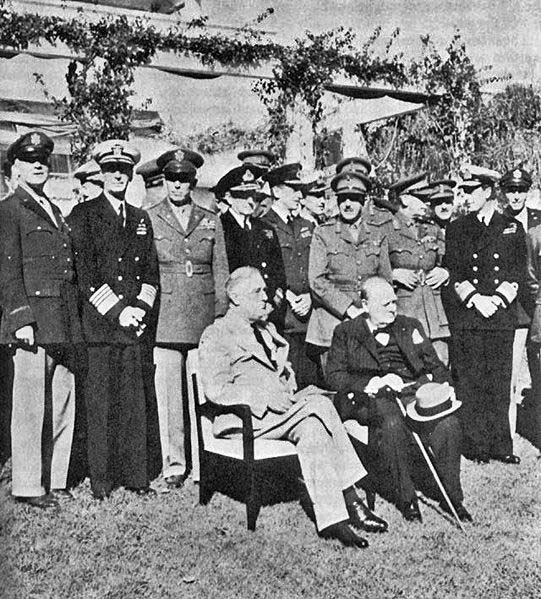 The Casablanca Conference took place at the Anfa Hotel Casablanca, Morocco. This meeting happened between January 14 to 24 in 1943, with the intention of planning the Allied European tactic for the next phase of the Second World War. In attendance were the British Premier, Winston Churchill, and U.S. President Franklin D. Roosevelt. The Soviet Prime Minister was also invited to the conference but did not attend since the Red Army was involved in a major battle against the German troops at that time. Free French forces were represented by Gen. Charles de Gaule and General Henri Giraud.
The Casablanca Conference took place at the Anfa Hotel Casablanca, Morocco. This meeting happened between January 14 to 24 in 1943, with the intention of planning the Allied European tactic for the next phase of the Second World War. In attendance were the British Premier, Winston Churchill, and U.S. President Franklin D. Roosevelt. The Soviet Prime Minister was also invited to the conference but did not attend since the Red Army was involved in a major battle against the German troops at that time. Free French forces were represented by Gen. Charles de Gaule and General Henri Giraud.
Discussions and Agreements
There were three main topics of discussion during the Casablanca Conference: European invasion, Free French forces leadership and post-war northern Africa. In the European invasion topic, President Roosevelt under the advice of U.S. Army Chief of Staff, General George Marshall and Chief of Naval Operations, Admiral King, lobbied for a traverse channel attack of Europe. During the conference the attention of Roosevelt was mainly focused on pacific front. He also faulted the British for not committing themselves fully against Japanese entrenchment. The British Premier on the other hand, argued that the time was not appropriate and lobbied for Allied attack on Sicily creeping up through Italy. Roosevelt acceded to this approach for Europe, and therefore the policy was agreed upon.
Leadership of Free-French forces was another major topic of discussion during the Casablanca Conference. The meeting called for the official credit of a joint leadership of the Free-French forces by Henri Giraud and Charles de Gaulle. These two generals had a notable tension between them during the talks. President Roosevelt affected cordiality between the 2 men publicly and encouraged them to shake hands and demonstrate mutual affability for photographers. The two men shook hands in a reluctant manner and so quickly that the photographers asked them to pose for another shoot. Despite limiting their interaction during the conference, the two men pledged their mutual support.
Post-war Northern Africa
This was another discussion that was held in the conference that saw Roosevelt speak with the French resident general at the capital of Morocco, about Jewish immigrants and postwar independence in North Africa. The disposition of the population of Jews harkened back to an outlook communicated previously to Roosevelt by William Dodd, who was the American ambassador to Germany from 1933-1937. During the conference, the leaders resolved to reinforce their planned bombing crusade against Germany. In addition to that, they agreed to open-up new supply lines from Burma to China and eject Japan from Papua New-Guinea through a military procedure.
Unconditional Surrender
During the last day of the conference, Roosevelt proclaimed that he and Churchill had determined that the only means of ensuring postwar peace was to adopt “unconditional surrender” policy. The doctrine of unconditional surrender was one of the most prominent developments at the Casablanca Conference. Here, an integrated statement of purpose of the conference was announced to the entire world claiming that Allies expected unconditional surrender of the Axis power. The term “unconditional surrender” was borrowed by Roosevelt from General Ulysses Grant. President Roosevelt made a radio address on February 12, 1943, laying forth the principles of “unconditional surrender”. Although this was seen as a common standing ground of the U.S. and Britain, some sources claim that these two nations were not united in the pledge to see the war through to Germany’s admission of defeat.
It is believed that the President made that announcement with the intention of effectuating 2 goals. The first one was keeping Soviet army busy with Germany on the Russian front, thereby exhausting German troops and munitions. The second goal was to prevent the Soviet Premier from participating in a separate negotiation with the Nazi regime. The “unconditional surrender” policy was not unanimously welcomed. In fact, some diplomatic insiders termed this as unequivocal and inflexible. Some also thought that this would cancel out prospect for political maneuvering as well as morally incapacitating to German and French resistance groups.
Consequences of the Conference
President Roosevelt presented the findings of the Casablanca Conference to Americans through a radio address on February 12, 1943. The consequences of vital guidelines made in the Conference have been subject to serious examination and re-evaluation. In fact some critics say that the decisions made at the conference prolonged the war unnecessarily in Europe and increased civilian casualties.